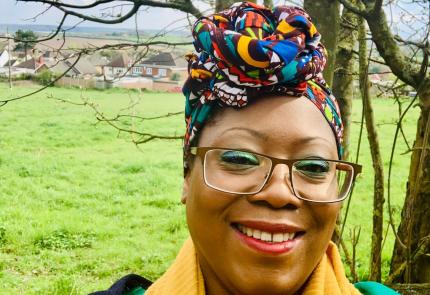Q: How did you find managing your diabetes in the early days?
In the early days I found managing my diabetes extremely difficult. At the time I didn’t even know I had it – I was in hospital because I needed a cyst removed and I found out that I had diabetes from an agency nurse shouting it out across the ward. So that was my first introduction, and I think after that I didn’t really get the support I needed. The GP gave me a leaflet about healthy eating and lifestyle but that was it. There was a lot of scaremongering, I was told that I need to be careful because as a diabetic I could lose fingers and toes or have my leg amputated. At the time I remember just feeling that kind of loneliness and abandonment, and deep depression.
I was diagnosed in 2002 so there wasn’t much information online then. I just got on with life, but my health was bad because I just didn’t understand how to manage it. I didn’t go to many appointments because they were so depressing, it wasn’t until I moved in 2006 that things began to improve. At my new doctor’s surgery I had a diabetic nurse who sat me down and explained things. She said that my HbA1c wasn’t good, and I said, ‘What’s that?’, because it had never been explained to me before.
I was given lots of medication which wasn’t explained to me. They had put me on a tablet called Metformin, which gave me really bad stomach aches. It was just terrible, and I was on that for a few years before I moved, and then I was told that there is another Metformin which is slow release which was better for me. Things like that didn’t get picked up in the early days.
Q: Did you have any experience of other diabetes self-management or advice programmes?
I got referred to DESMOND, which is a programme for newly diagnosed patients, but I had already been diabetic for six years. I really didn’t find it helpful, I felt uncomfortable because I was the youngest and only black person there. A lot of the things we were taught didn’t really apply to me, because by that time I was already using the internet, going on forums, and checking things out for myself.
Q: How did you hear about Heal-D? What did you think of the programme when you joined?
I heard about HEAL-D from a diabetic nurse at the GP surgery. My initial thought was ‘Please, not another one!’ because the DESMOND programme had really put me off. I told her it just wasn’t relevant to me, and I don’t think I learnt anything but the nurse was very persuasive, so I said I would try it. After she signed me up, I was contacted a week later by email to set up an appointment and have a chat. That was with Dr Louise Goff; she told me all about the programme and I remember thinking that there was no way I wanted to get involved in it. I told her it sounds nice but I’m not going, and I told her my experience of not receiving proper diabetic care.
She said that I could just come to one session and that she’d appreciate any feedback. So I agreed to that, my intention was just to go for one session. Then a few days later a package came through the door, with a very interesting and brightly coloured manual, and an exercise band, which I had no idea what to do with as I’d never seen one before! I took time to flick through the book and I noticed that it did mention a range of foods. This had been one of my concerns, as Louise had told me that the programme was looking at foods from the African and Caribbean community. Although I am from a West Indian background, I don’t tend to eat a lot of food from my culture, so I was pleased to see that the booklet included things like pasta and other foods from around the word, as well as African and Caribbean.
Q: Tell us about your experience on the programme: how was it different, what aspects did you enjoy and find most useful?
At the first session I was taken aback when the screen came on and there were people who looked like me and there were people my age. I was shocked. I felt at ease, it was like talking to a group of friends, it was really nice. I didn’t feel like I was being talked at, everybody was sharing their experiences and we were asking lots of questions. I thought I knew everything about diabetes, but there were so many aspects that I hadn’t thought about. It was nice to get that peer-to-peer support. It was so different to anything I had ever been on, there seemed to be a real care about our cultural background. The other thing that really surprised me was the exercise – doing exercises online really shocked me. It was really quite exciting; it was amazing to release those happy endorphins. The group was so fantastic and supportive, we were bouncing off each other, and Louise and Sandra were amazing. I remember thinking I have never come across anything like this, this is so unique. I enjoyed it, and when it came to an end, I was quite sad. I can’t believe I almost didn’t go.
